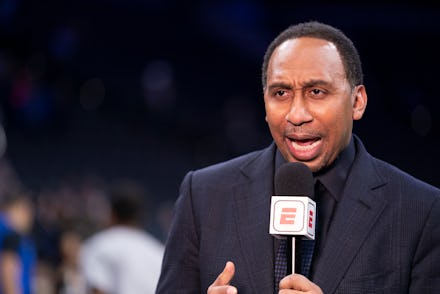ESPN seems a little too comfortable airing Stephen A. Smith's anti-Asian rhetoric

Ahead of the festivities for this year’s MLB All-Star week, during which the league's unequivocally brightest star Shohei Ohtani will surely steal the show, analyst and resident ESPN loudmouth Stephen A. Smith issued a dubious take. "I don't think it helps that the number one face [of baseball] is a dude that needs an interpreter so you can understand what the hell he's saying in this country," Smith proclaimed during a segment on ESPN’s First Take yesterday.
The argument has been roundly criticized, not only as an objectively bad opinion, but also as a xenophobic, deeply harmful one. The response has, rather surprisingly, forced Smith — who initially responded with an evasive, glib explanation chalking the controversy up to misinterpretation — to apologize online and in today's episode of First Take. The more troubling aspect, though, lies in the pre-designed nature of the controversy and what it implies about our considerations of anti-Asian sentiments.
First, though, it ought to be acknowledged that what Smith posited is unquestionably stupid purely as a sports take: halfway through a record-shattering season, Ohtani, who is Japanese, has been universally acknowledged as the most unique and phenomenal baseball superstar that the league has seen in generations. In his remarkable two-way player abilities as both a pitcher and hitter — Ohtani headlined last night's Home Run Derby and has made MLB history as the first player ever selected to the All-Star Game as both a hitter and a pitcher — he is persistently compared to the mythic Babe Ruth. In other words, Ohtani is, a vast majority of fans would agree, unquestionably good for the league and the game of baseball, regardless of his English-speaking abilities.
But Smith already knows this. He already knows that Ohtani is a phenom that represents a boon, even a godsend for a sport whose popularity has been waning for years. Take it from Smith himself: just a week ago he spent time on ESPN Plus chastising the league for not doing enough to market Ohtani as a once-in-a-lifetime talent. In essence, he had already advocated for Ohtani to be publicized more as the face of baseball. So why would he issue a new verdict, heavily implying that Ohtani is in fact bad as the face of baseball, only days later?
Smith, one would assume, did not have a sudden change of heart — he likely does not truly care an inkling about the fact that Ohtani requires an interpreter — and the segment itself was constructed as a hot take on a show known for hot takes. Of course, segments like this happen all the time on programs of all kinds — they manufacture storylines, talking points, controversies to fill time and complete the job of making a show. But what’s troubling is that Smith and the show's producers knew that this segment would ruffle feathers, that it would go viral and generate uproar, or at least chatter. In the online fury, in pieces like this one, there is an aspect of playing into the show’s hands.
But what is important is recognizing why Smith and the show’s producers felt comfortable toeing what should, in fact, be an extremely sensitive line. Not only does the take, as has been echoed across the internet, reinforce a racist stereotype of Asians as perpetual foreigners — it comes amid a year of violent, and at times deadly, anti-Asian hate and attacks, motivated by misguided Covid-fear, throughout the nation. The segment also occurs on the heels of the Rachel Nichols debacle, which very publicly outed ESPN as an outdated institution that repeatedly mishandles issues of racist discrimination within their own ranks.
In light of all this, Smith and the First Take team must have been aware of the tricky implications of this Ohtani take (and if they didn’t know and were blind to this context and the racist implications of the segment, that ignorance itself is perhaps even more disconcerting). Yet, they ran it anyways, perhaps implicitly safeguarded by the time-worn truth that brazenly anti-Asian xenophobia tends to be passable. Even after a frightening year that has seen a exceptional spike in such sentiments, there is a sense from this deliberately outrage-inducing incident that a controversial, racist segment is still considered worth constructing and green-lighting — because even if outrage occurs, it won’t be costly enough to outweigh the clicks that come as a result.
What does deviate from history is that the blowback forced an actual concession. It is Smith's M.O. to owe his big-talking to misinterpretation, but the overwhelming ire, including prominent voices calling for his suspension, forced him to apologize. Perhaps Smith is still irked in his head at his need to cow to what he perceives to be an online mob. Or perhaps he did, in fact, come to realize that regardless of what he thought to be simply a thought exercise about Ohtani's stardom, the take was, particularly in light of this year, out-of-touch at best and dangerous at worst.
Regardless, this dust-up will be blown over within another day — a reality that can feel at once sad and reassuring. The fact that the segment ran in the first place feels like a tragic reflection of how thoughtless Asian xenophobia can be treated — but perhaps the ensuing reaction is indicative of some sort of shifting understanding. More importantly, none of it will be remembered in the shadow of what will and should be remembered — the Ohtani show that will take hold this All-Star week, and that will continue seize sports fans for the rest of his historic, awe-inspiring season.